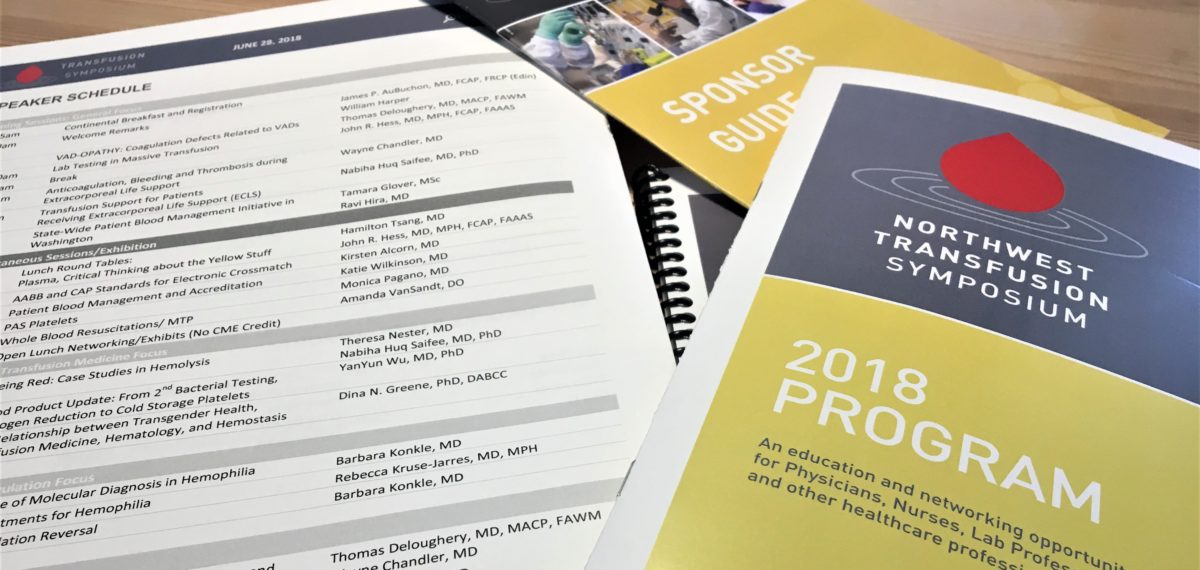
Not every professional conference begins with a large portion of the audience in tears. But that’s how Bloodworks Northwest’s fourth-annual Northwest Transfusion Symposium began, as 28-year-old former leukemia patient William Harper told his harrowing story of getting cancer in Senegal in 2010 and needing 267 blood transfusions and 33 surgeries in the years since then to survive.
“I am proof that because of the work you do every single day,” he said to the gathered physicians, nurses, lab professionals, and medical researchers, “people like me get to have happy endings instead of sad ones.”
Harper’s speech set an inspirational tone for the event, and helped remind attendees of the impact their work has on patients who many in attendance rarely if ever get to meet. Following Harper’s heartfelt words, the event took a decidedly more technical and academic turn, living up to its billing as “an education and networking opportunity.”
“The event is pretty informal, but also very informative for many people,” said Dr. YanYun Wu, Chief Medical Officer at Bloodworks and one of the event’s organizers. “And I think that’s the value of this sort of small community education event. You’ll hear about best practices and collaborative work and be able to network.”
Presentation topics throughout the day spanned the spectrum of today’s blood science research. They included a discussion of new, lab test-based trauma protocols for patients needing massive blood transfusions (10 or more in 24 hours) from Harborview Medical Center’s Dr. John Hess, a talk from the University of Washington’s Dina N. Greene on how laboratories can administer more equitable care to transgender patients, and a case-based panel discussion on anti-coagulation and reversal, among many others.
This year, the speaker lineup included a heavy focus on coagulation and anticoagulation and the associated risks and benefits of new medications, a hot topic in blood science circles today. “I think that people struggle a lot with coagulation-related issues,” said Dr. Kirsten Alcorn, an event organizer, Bloodworks Patient Services Physician and the Medical Director of Transfusion Services at numerous Seattle-area Swedish Hospital locations.
“In a pretty rapid amount of time,” Alcorn added, “a bunch of new anticoagulants have come on the market, and some don’t have reversal agents and because of the different mechanisms of these mediations, we’re also using testing differently.” Due to the timeliness of this topic, the speaker lineup this year was particularly renowned.
“That’s why we were able to recruit truly excellent speakers who are international experts in those areas,” Wu said. “It’s really a local event, but at the knowledge level of an international meeting. So we’re very pleased about that.”
One of the most exciting presentations came from Tamara Glover, MSc and Dr. Ravi Hira, MD, who spoke about the first-in-the-nation Washington State Patient Blood Management Cardiac Initiative.
The program, a partnership between the Washington State Hospital Association and the Clinical Outcomes Assessment Program, a regional nonprofit, uses data and collaboration to help hospitals reduce the need for blood transfusions, decrease health care costs, and ensure that blood components are available for patients who need them.
“Patient blood management has really caught on fire in the last 5-10 years,” Alcorn said. “The goal is to really refine our practice to get the best bang for our buck out of transfusion therapy. The right product, the right patient, the right time. That’s the buzz phrase.”
Wu, a co-chair of the program, gave an enthusiastic introduction of the Glover and Hira. “The idea is to provide appropriate transfusion care for patients,” she later said, “which can mean no transfusion or even just medication. By working with the hospitals, including the highest level of administration, we can provide almost like a precision transfusion medicine to the patient and try to solve some of the educational and systematic issues.”
At the end of the day, participants relaxed during a cocktail hour, giving colleagues and friends a chance to network and reconnect. For Wu, the event’s takeaway was simple. “The work either done by our Bloodworks researchers or by the professionals we invited is definitely some of the newest, most cutting-edge research out there,” she said, “so it was great to be able to bring that updated knowledge to our colleagues.” And for that, critical patients throughout the Pacific Northwest stand to benefit.
Tell Us What You Think!